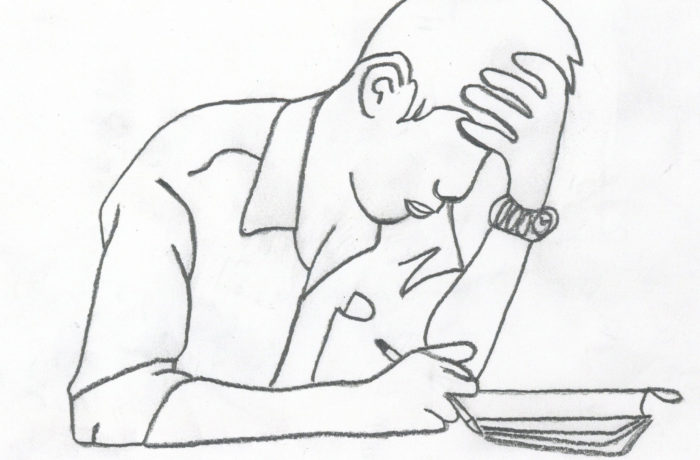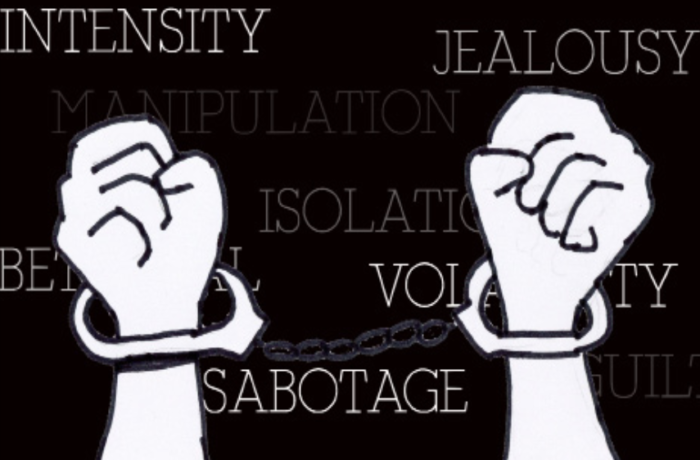…and maybe even connect with someone

In a survey of 233 students at St. Michael’s College many mentioned the death of traditional dating, and a fast-paced toxic hook-up culture. Yet statistics show that fewer people are hooking up than one might believe. The survey revealed that people do indeed still go on dates similar to the good ’ole days of Danny and Sandy sharing a milkshake at the sock-hop.
“What’s talked about are the hookups, not the relationships,” said Jenna Emerson, a health educator specializing in sex and relationships at the Health Center for Well-Being at the University of Vermont. In fact, only 30 percent of the student population are having 70 percent of the hookups. That leads to misperceptions.
“We think that everyone’s doing it and if you’re not you’re missing out.
“Because of the culture of the swipe there’s this idea that there’s always a better option,” said Emerson, explaining that technology and online dating influence how students think about dating. “We’re so ephemeral with dating, students have called it a game, where people are seen as objects. It’s easy to be like: ‘OK I’m going to play this game of hookups just for the experience,’ rather than looking to make a connection. Sometimes we forget these are humans with feelings.”
Popular media sets up many of these unrealistic expectations for college, leading students to believe that they are supposed to want hookups without authentic connection, according to Emerson.
“At the end of the day everyone is like looking for some sort of connection and sense of belonging. It’s a natural human want. With hookup culture there is a false sense of not caring.”
Kathy Butts, director of personal counseling at the Bergeron Wellness Center, hears the same thing. Many people say “I hooked up with so and so and then we never spoke again,” or “I’m supposed to act like I don’t know him when I see him in class,” she said.
It’s hard to pinpoint exactly where this “sense of not caring” stems from, and whether or not it is authentic.
“We’re just hooking up.”
“You care about each other, you’re close friends, you’re having sex, you’re spending the night, having breakfast the next morning. Well…that’s a relationship. We’re scared about that for some reason because we think it’s going to be limiting, ” Emerson said.
“People try to keep it really ambiguous because vulnerability is scary. If you’re just hooking up it’s not that risky, but if you’re expressing true feelings for someone that’s a huge emotional risk,” Emerson said.
 Following the rules
Following the rules
“A lot of people talk about how they are supposed to act like they don’t care. You hook up with someone, you may have feelings for them but you can’t let them know that and you have to act like it’s no big deal. Meanwhile you’re thinking, ‘Oh my god I wish he/she would text me,’” Butts said.
Figuring out what you want
Perception of social norms for hookups and dating can prevent students from seeking true desires or an authentic connection.
“If there’s a disconnect between desire and behavior, that can be really tricky for people to be satisfied. It’s helpful if people decide ‘I do not have time for a relationship, I just want to hook-up with people,’ or, ‘I don’t want to hook up with anyone until I have an emotional connection,’ rather than lying to themselves,” Emerson said.
The trick to successfully navigate the maze of relationships is to understand your wants and needs.
Understanding where you lie on the spectrum of commitment can be difficult. “There’s this sort of new feminist thing in which women want to be able to do what men [stereotypically] do: have sex and not have commitment too. But also a lot of people that I talk to seem to want a relationship but they are scared of it, so they avoid commitment,” said Butts.
“It’s a lot of knowing yourself and being able to recognize how things make you feel,” Emerson said. When she counsels students, she will try to pinpoint underlying issues.
“If you’re not over your ex, let’s talk about that. If you are scared of getting hurt, let’s address that.”
One roadblock to that self-awareness is a desire to follow cultural expectations. “We don’t have great examples of intimate relationships. They’re not fun to watch on TV. Two people just watching Netflix is not as entertaining as people having a crazy one-night-stand. But, you don’t have to meet cultural expectations if they don’t work for you.”
 Taking the next step
Taking the next step
You really like the person you’ve been hooking up with. You’re on the brink of a potentially crushing “What are we?” talk. You’ve done vast reflection and know you want to commit, but are scared of being vulnerable. What do you do?
“Communicate it, define it, make it more certain,” Emerson said. “That’s also the scariest option. Even though clarifying a relationship is really hard in the moment, it is so rewarding.”
When making-it-official it’s helpful to realize the possibility of rejection. “By avoiding rejection we end up just rejecting ourselves. Before we even define a relationship things in our head say ‘I’m not good enough. Why would they want to date me?’ That’s still rejection.”
All relationships, not just romantic and sexual, require some level of vulnerability and emotional risk taking. “My big advice is practicing vulnerability. Opening up to your friends, your family, etcetera will give you a lot of practice to open up to a romantic or sexual relationship that feels good to you.”
Prolonging the “What are we?” conversation only prolongs the emotional risk. “Even if you wait a month, two months, or one day it’s gonna happen. Rejection is a part of that risk, but when vulnerability is reciprocated you are opening yourself up to much deeper connection with somebody on a more intimate level.”
Doing your own thing
What about students who aren’t making the connections they hoped for? Whether they are specifically not active in hookup culture, or haven’t found someone that they feel comfortable with, where does that leave them in all of this?
These are the majortiy, Emerson said. “It might seem really lonely. But, statistically more people are like you.”
It’s your business. “You don’t have to place a value judgment on these behaviors. If you don’t have sex in college–that’s fine. If you’re hooking up every weekend–that’s also fine. We can get really judgmental, and should take the morality out of it. Just let people live.”


